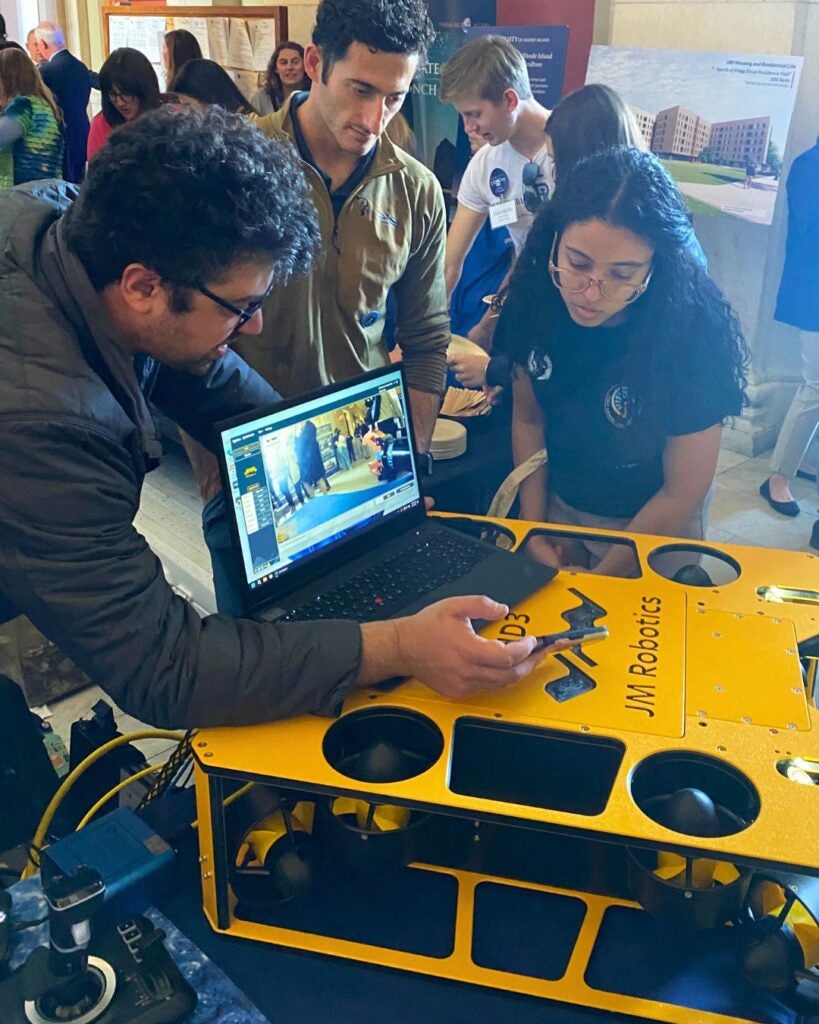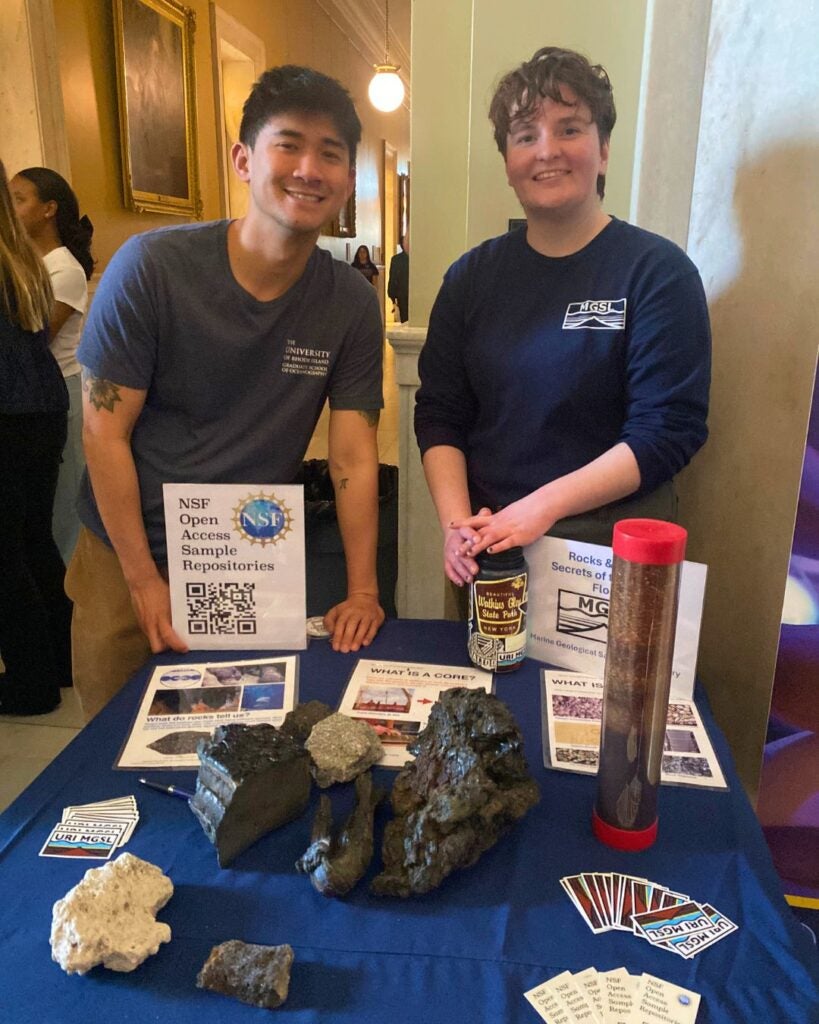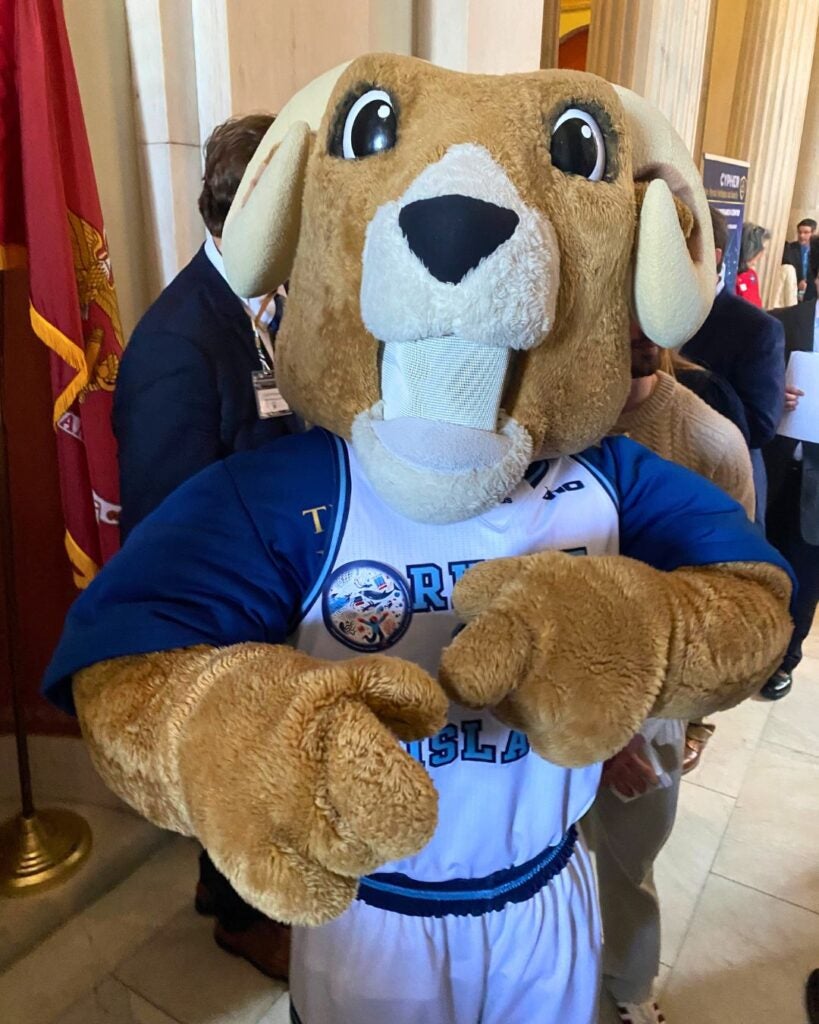April 3, 2025
An investment in the University of Rhode Island is an investment in the residents, the economy, the well-being, and the future of Rhode Island, proclaimed several state leaders gathered in the State House Rotunda as representatives of URI touted the research, education, and region-wide impact of “Rhode Island’s university” during URI Day at the State House April 1.
Dozens of legislators, administrators, and other state leaders saw first-hand the impact URI has on the region as students, faculty and staff members presented a series of interactive exhibits. From underwater robotics to health care, artificial intelligence to fuel explosion science, superconductors to fish cameras, the exhibits highlighted the University’s wide array of educational and research achievements.
“The research and work done on campus have attracted some of the best minds to study and work right here in Rhode Island. That’s a great thing not just for URI, but for our state,” said Antonio Afonso, chief of staff to Gov. Dan McKee. “These accolades inside and outside of the classroom show that the investments Gov. McKee and the General Assembly have made in URI is money extremely well-spent. We want to keep that support going and continue to see URI succeed in a very big way. It’s going to take a strong team working together to help the state reach its goals, and we see URI as a strong partner to help us make that happen.”
Afonso and Speaker of the House K. Joseph Shekarchi touted investments the state and its voters have made in the University, including $87.5 million to build a new biomedical life sciences building on the Kingston Campus, which voters approved in a November ballot referendum. There are also ongoing renovations to the Fine Arts Center, the Narragansett Bay Campus, athletic facilities, and campus infrastructure.



“URI teaches students to dream big and achieve big things. As you can see, they’re doing just that,” Shekarchi said. “I’m very proud of our public university that gives students a world-class education, while being affordable and attainable. URI is giving students hands-on experiences while tackling some of the most important issues facing our state, our country and our society. The research happening at URI is incredible, from oceanography and climate change to molecular biology and housing. It is a key driver of workforce and economic development. I’m so proud of everything URI offers to our students and state, which makes us all so proud.”
State Sen. Susan Sosnowski, who represents South Kingstown in the General Assembly, likewise touted the biomedical expertise at URI, and the enormous potential to expand in the future. In addition to supporting the biomedical facility, Sosnowski serves on a commission exploring the feasibility of creating the state’s first public medical school at URI.
“This will be another way our respected flagship university can grow, while fueling economic growth and also addressing the primary care crisis,” Sosnowski said. “URI puts Rhode Island on the cutting edge of leading research, helps drive our economy, opens gateways of opportunity for tens of thousands of students, and contributes so much to the fabric of Rhode Island. It is such an asset for our state. I am proud to support numerous investments in URI over the years, and I will continue to do so.”
Those investments have delivered an incredible return to the residents of the state, according to Margo Cook, chair of the URI Board of Trustees. Not only is URI ranked the No. 1 public university in New England, it also has achieved prestigious R1 research status by the Carnegie Classification of Institutions of Higher Education, and led investment in the Blue Economy, life sciences, fine arts, engineering and more. The successes add up to a return of $6.25 to the Rhode Island economy for every dollar invested in URI.
“I don’t have to be a finance major to know that’s a good return on investment,” Cook said. “The investment from the state is making a massive impact, and that investment is working. Together, we are educating the state’s highly skilled workforce of the future. And we’re driving economic growth for the state and the region. We are Rhode Island’s university, and we will continue to enhance our relationship with the state to improve the lives of all Rhode Islanders.”
URI President Marc Parlange told the crowd the successes are shared by all URI entities, from pharmacy to education, ocean robotics to fine arts, neuroscience to business development.
“Today what you see is just a snapshot of the excellence we have at URI,” Parlange said. “I want to thank all of you for presenting your research and talking about your education programs. You really represent the best of the state of Rhode Island in so many different ways, and you have made transformative changes in the lives of so many. There are many, many good things to celebrate. We really appreciate the support we’ve received from the state. An investment in URI is really an investment in the future of the state.”
Parlange also took time to acknowledge the continued support of Gov. McKee, Speaker Shekarchi, Senate President Dominick Ruggerio, and members of the General Assembly, as well as Lt. Governor Sabina Matos and state officers Secretary of State Gregg Amore, Attorney General Peter Neronha, and Treasurer James Diossa. Parlange also recognized the South County delegation for their ongoing partnership and support, including Sen. Sosnowski, Sen. Alana DiMario, Rep. Carol McEntee, Rep. Kathy Fogarty, Rep. Teresa Tanzi, and Rep. Tina Spears.
The opportunity URI presents for all Rhode Islanders is reflected in student RJ Fatorma, a nursing and psychology double-major who participates in URI’s Talent Development program. Fatorma, who opened the speaking program at the State House, touted the support he received as a first-year student from his professors and representatives of Talent Development, fellow students, clubs, and research projects he has joined.
“That community has been such a positive part of my experience,” Fatorma said. “As a first-generation college student, I chose URI because of all the resources they offer. There is a special culture at URI. Students also have so many opportunities to participate in research, as we’ve seen with all the research projects here today. I have grown so much as a person, student and leader. As a born and raised Rhode Islander, I believe every student should have the opportunity to go to URI and have the same education and opportunities that I’ve had.”
The opportunities afforded to students, and the benefits they deliver to Rhode Island and beyond, were on full display in the hallways outside the chambers of the state Senate and House of Representatives. Students and professors showcased their cutting-edge research into artificial intelligence, superconductor technology like that used on high-speed trains, the science of fuel-air explosions, and the use of robotics in industrial and systems engineering, among many more.
The University’s commitment to public scholarship and the creative arts was also on display, with students participating in URI Theatre’s upcoming production of “Guys and Dolls” in attendance in full theatrical costume.
Presentations from the George and Anne Ryan Institute for Neuroscience and the Rhode Island IDeA Network for Biomedical Research Excellence (INBRE) further bolstered the biomedical advances being made at URI, as did the College of Engineering, which displayed a robotic arm in motion, as well as wearable devices using electromyography that could help rehabilitate neurodegenerative disease.
Nursing students discussed health care and the college’s respite care program, while pharmacy students and faculty members talked about vaccines and opioid use disorder, including the life-saving work of the Community First Responders Program. The Department of Geosciences displayed rocks and fossils found around the world, while the Graduate School of Oceanography showcased underwater robots, and ocean sediment cores that are provided to researchers around the world. The displays just scratched the surface of all URI has to offer.
“URI is the source of enormous pride for so many Rhode Islanders. It is such an asset for our state,” Shekarchi said. “Today is URI Day not only here in the State House, but in Rhode Island.”

